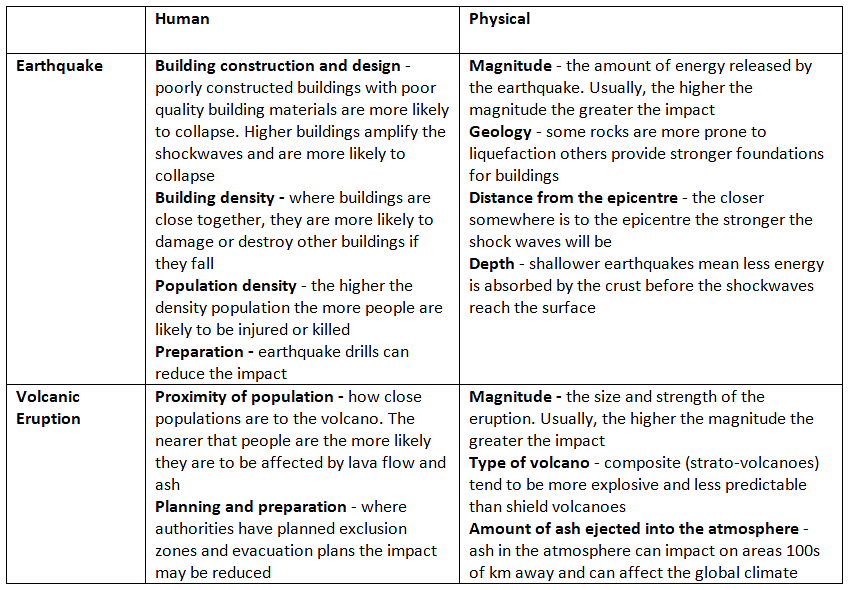Year 11 Exam > Year 11 Notes > Geography for GCSE/IGCSE > Effects of Earthquakes & Volcanoes
Effects of Earthquakes & Volcanoes | Geography for GCSE/IGCSE - Year 11 PDF Download
Effects of Earthquakes & Volcanic Eruptions
The impacts of earthquakes and volcanic eruptions can be categorized into:
- Primary hazards - these are a direct result of the earthquake or eruption
- Secondary hazards - these occur as a result of the primary effects
Factors affecting the impacts of earthquakes and volcanic eruptions
- All earthquakes and volcanic eruptions are unique
- The impacts that they have depend on a range of factors, both human and physical

Question for Effects of Earthquakes & VolcanoesTry yourself: What are primary hazards of earthquakes and volcanic eruptions?View Solution
Effects of earthquakes and volcanic eruptions
While earthquakes and volcanic eruptions have distinct characteristics, they share numerous similar impacts.
These impacts encompass:
- Loss of life and injury: This can occur immediately from collapsing structures or ash fall. Additionally, it may manifest in the days following the event due to issues like contaminated water or diseases.
- Collapse or destruction of buildings: This results in individuals being displaced, sometimes for extended periods, leading to homelessness.
- Impact on transport networks: Roads, bridges, and railways may suffer damage or be completely destroyed. This hinders the rapid delivery of aid to affected regions.
- Loss of jobs and businesses: The economy is adversely affected when manufacturing plants and offices are damaged or ruined.
- Loss of crops: This contributes to food shortages and adversely impacts the income of farmers.
- Damage to power and water supply: The availability of clean water is compromised when power and water infrastructure is damaged.
- Environmental damage: Destruction of vegetation and habitats, along with the effects on climate due to ash, are significant consequences.
- Closure of airports: Ash clouds pose a danger to jet engines, potentially causing engine failure. Consequently, flights are canceled for safety reasons.
Question for Effects of Earthquakes & VolcanoesTry yourself: Which of the following is a common impact of earthquakes and volcanic eruptions?View Solution
The document Effects of Earthquakes & Volcanoes | Geography for GCSE/IGCSE - Year 11 is a part of the Year 11 Course Geography for GCSE/IGCSE.
All you need of Year 11 at this link: Year 11
|
57 videos|70 docs|80 tests
|
FAQs on Effects of Earthquakes & Volcanoes - Geography for GCSE/IGCSE - Year 11
| 1. How do earthquakes and volcanic eruptions affect the environment? |  |
Ans. Earthquakes and volcanic eruptions can cause environmental damage such as landslides, tsunamis, and the release of harmful gases into the atmosphere. They can also impact ecosystems by destroying habitats and altering landscapes.
| 2. Can earthquakes and volcanic eruptions trigger other natural disasters? |  |
Ans. Yes, earthquakes and volcanic eruptions can trigger other natural disasters such as wildfires, avalanches, and mudslides. These secondary disasters are often a result of the initial seismic activity or volcanic eruption.
| 3. How do earthquakes and volcanic eruptions impact human populations? |  |
Ans. Earthquakes and volcanic eruptions can have devastating effects on human populations, causing injuries, death, displacement, and damage to infrastructure. They can also lead to economic losses and disrupt communities and livelihoods.
| 4. What are the long-term effects of earthquakes and volcanic eruptions? |  |
Ans. The long-term effects of earthquakes and volcanic eruptions can include ongoing geological instability, environmental changes, and the potential for future seismic activity. These events can also have lasting social and economic impacts on affected regions.
| 5. How can communities prepare for the effects of earthquakes and volcanic eruptions? |  |
Ans. Communities can prepare for the effects of earthquakes and volcanic eruptions by implementing emergency response plans, conducting drills and exercises, educating the public on safety measures, and investing in infrastructure that is resilient to seismic activity.
Related Searches


















